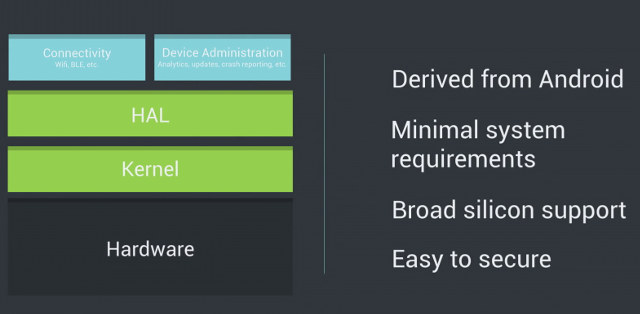You’d think there are already enough lightweight operating systems that could provide a good enough platform for IoT and embedded projects, but Google decided to make their own Brillo operating system for IoT, based on Android, most probably to leverage the existing Android tools, and make it easier for app developers to move to the Internet of Things space. Brillo ‘s hardware requirements are pretty low as the operating system can run on devices with 32MB of RAM, and 128MB of storage.

Google will provide a complete ecosystem with an embedded OS, core services, and a developer kit with tools to build, test, and debug. Just like in Android, three architectures will be be officially supports, starting with the following hardware platforms:
- ARM – TechNexion Pico-i.MX6UL system-on-module based on Freescale i.MX6 UltraLite and Broadcom BCM4339 802.11ac + Bluetooth 4.0 wireless module, combined with PICO-DWARF baseboard.
- MIPS – Upcoming MIPS Creator CI-40 development board with Ensigma C4500 RPU with 802.11ac 2×2 MIMO and Bluetooth 4.1 support
- Intel – Intel Edison board powered by Intel Atom processor and Quark MCU and providing dual band 802.11 a/b/g/n Wi-Fi connectivity (Broadcom 43340) and Bluetooth 4.0. Check out Intel’s Brillo page for details.
All Brillo boards support WiFi and Bluetooth connectivity, and Brillo also includes Google’s Weave communication protocol for IoT devices that is said to enable easy setup, phone to device to cloud communication, and user interaction from the web or mobile apps.
The short introduction below video give an overview of Brillo, and provides some details about features (OTA updates, crash reports…), and how users can use familiar tools such as adb (Android Debug Bridge) to debug their IoT applications, and Android.mk build architecture.
You can find some more information on Google’s Developers’ Brillo page, but for full information, including source code, tools, and documentation, you’ll need to request an invite on the developer, and provide details about your project. You can also request an invite if you plan on keeping using your existing Linux operating system but would like to Weave.

Jean-Luc started CNX Software in 2010 as a part-time endeavor, before quitting his job as a software engineering manager, and starting to write daily news, and reviews full time later in 2011.
Support CNX Software! Donate via cryptocurrencies, become a Patron on Patreon, or purchase goods on Amazon or Aliexpress




